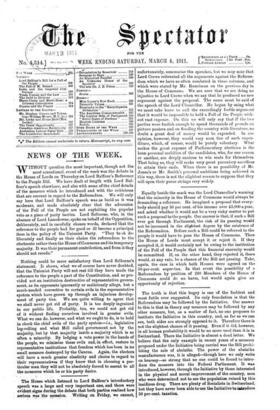Equally beside the mark was the Lord Chancellor's warning that
the minority in the House of Commons would always be demanding a reference. He imagined a proposal that every- body should pay 50 per cent. of his income over £5,000 a year, and asked whether it would not be a very risky matter to put such a proposal to the people. Our answer is that, if such a Bill ever got through Parliament, the risk of its passing would not be increased in the slightest degree by the existence of the Referendum. Before such a Bill could be referred to the people it would have to pass the House of Commons. Then the House of Lords must accept it or reject it. If they accepted it, it would certainly not be owing to the institution of the Poll of the People that this financial enormity would be committed. If, on the other hand, they rejected it, there would, at any rate, be a chance of the Bill not passing. Take, again, the case in which both Houses were agreed on the 50-per-cent. super-tax. In that event the possibility of a Referendum by petition of 200 Members of the House of Commons could do no harm, but would again give an opportunity of rejection.










































